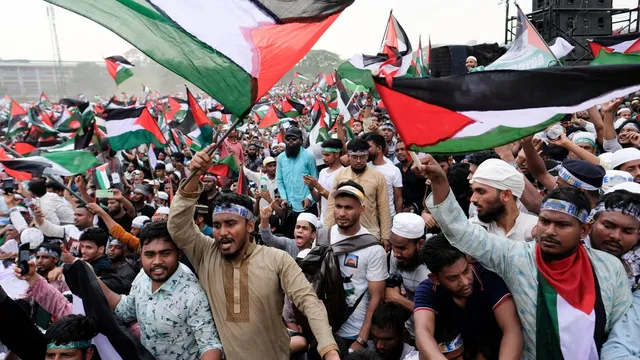
Bangladesh protests against Israel’s actions in Gaza draw 100,000 people
2025-04-12 13:06- Tens of thousands of protesters rallied in Dhaka's Suhrawardy Park.
- Demonstrators carried Palestinian flags and chanted slogans against Israel’s actions.
- The large turnout reflects Bangladesh's ongoing support for an independent Palestine.
Express your sentiment!
Insights
On April 12, 2025, a large demonstration took place in Dhaka, the capital of Bangladesh, where tens of thousands of people gathered to express their condemnation of Israel’s military actions in the Gaza Strip. The protest, estimated to have around 100,000 participants, was organized at Suhrawardy Park in the Dhaka University area and drew support from various political groups, including the Bangladesh Nationalist Party and several Islamist organizations. Protesters displayed their disapproval by carrying Palestinian flags and chanting slogans such as 'Free, Free Palestine,' highlighting their solidarity with the Palestinian cause. The demonstration included symbolic visuals, such as effigies and coffins representing civilian deaths in Gaza, reflecting deep-rooted sentiments against perceived U.S. and Israeli aggression. Images of prominent political leaders like U.S. President Donald Trump, Israeli Prime Minister Benjamin Netanyahu, and Indian Prime Minister Narendra Modi were also targeted, with claims of their complicity in the suffering of Palestinians. This protest reflects a significant moment in Bangladesh, a Muslim-majority country with a traditional stance of supporting Palestinian independence and opposing Israeli actions. Deep-seated animosity toward Israel and its allies continues to influence public sentiment, mobilizing thousands to demonstrate in favor of the Palestinian struggle for statehood. Such events underline the vital role that public demonstrations play in shaping political discourse, especially in nations with strong Muslim populations. With the background of ongoing conflicts in the Middle East, the rally serves as a reminder of the palpable global divisions regarding this issue and the continuing call for resolution and justice for Palestine. The protest also indicates the powerful influence of local political parties in galvanizing mass support around international causes, leading to significant expressions of national identity and political will.
Contexts
Bangladesh's stance towards Israel has been historically marked by a firm commitment to solidarity with the Palestinian cause and a rejection of formal diplomatic relations with Israel. The nation's foreign policy is largely influenced by its Islamic identity, and its close ties with Arab nations, which view the Israeli-Palestinian conflict as a fundamental issue affecting the Muslim world. As a result, Bangladesh has maintained a policy of non-recognition of Israel since its independence in 1971, emphasizing the importance of Palestinian statehood and advocating for the rights of Palestinians through various international forums, including the United Nations. This stance is viewed as a reflection of national principles, cultural ties, and political strategy to align with broader Islamic solidarity movements. In recent years, Bangladesh has reiterated its position on the Israeli-Palestinian conflict amidst regional changes and shifting dynamics. The normalization of relations between Israel and some Arab states, such as the United Arab Emirates and Bahrain under the Abraham Accords, has raised questions about how countries like Bangladesh would navigate their foreign policy in this evolving landscape. However, Bangladesh's government has consistently reasserted its commitment to non-recognition of Israel, emphasizing the need for peace based on the two-state solution. The Bangladesh Foreign Minister has stated that the country will not engage in any dialogue or diplomatic overtures with Israel until a satisfactory resolution for Palestine is achieved. Furthermore, public sentiment in Bangladesh strongly favors the Palestinian cause, which is reflected in public opinion and political discourse. Mass protests, campaigns, and expressions of solidarity with Palestine are common, reflecting the population's deep-rooted support for Palestinian rights. Political parties across the spectrum often rally around this issue, using it as a point of political mobilization and national unity. This public sentiment not only influences the government’s foreign policy decisions but also strengthens the narrative around Bangladesh’s identity as a supporter of oppressed Muslim populations worldwide. Such societal views underscore the significance of cultural and religious factors in shaping the nation's approach to international relations, particularly concerning Israel. In conclusion, Bangladesh's stance towards Israel is firmly rooted in its historical commitment to supporting Palestine and its identity as a Muslim-majority nation. The government’s position remains consistent despite changing regional dynamics and international pressures, and is a clear reflection of both its principles and the sentiments of its populace. As the global discourse around the Israeli-Palestinian conflict continues to evolve, it is likely that Bangladesh will maintain its current foreign policy approach, advocating for Palestinian rights and statehood while resisting normalization with Israel until a just and comprehensive peace is achieved.